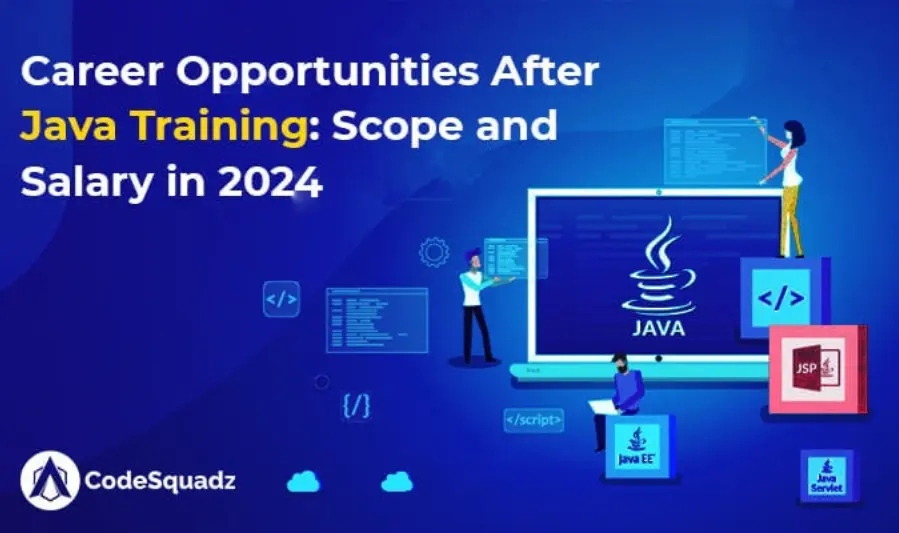Introduction
Java remains one of the most widely used programming languages in the world, powering enterprise applications, mobile apps, cloud-native solutions, and large-scale systems. Its platform independence, stability, and extensive ecosystem make it a go-to choice for developers and organizations alike.
As of 2025, Java continues to be highly relevant due to ongoing updates, modern framework support, and strong community backing, making it a valuable skill for both beginners and experienced programmers.
For aspiring developers, a career in Java offers diverse opportunities, from web and mobile development to enterprise software, cloud computing, and microservices architecture. This guide provides a structured roadmap to help beginners learn Java, build practical skills, and launch a successful career in the field.
Why Choose a Career in Java?
Java remains one of the most in-demand programming languages across industries, including finance, e-commerce, enterprise solutions, and mobile app development.
Key Reasons to Choose Java:
- High Demand Across Industries: Java skills are sought after globally, ensuring a steady stream of job opportunities.
- Versatility: Java can be used for backend services, frontend development (via frameworks), Android mobile apps, and cloud-native applications, making it a flexible skill for multiple career paths.
- Strong Community and Support: A vast global community of developers, extensive documentation, and open-source libraries make problem-solving and learning easier.
- Competitive Salary Potential: Experienced Java developers often command attractive salaries and benefits, reflecting the language’s ongoing relevance and enterprise adoption.
Top Java Career Opportunities in 2025

Java continues to power a wide range of applications, creating diverse career paths for developers. Here’s a detailed look at the top opportunities:
3.1 Java Backend Developer
- Role & Responsibilities: Develop server-side logic, manage databases, ensure high performance and responsiveness.
- Popular Frameworks: Spring Boot, Hibernate, Jakarta EE
- Skills Required: Core Java, RESTful APIs, SQL/NoSQL databases, microservices, version control
3.2 Java Full-Stack Developer
- Role: Handle both frontend and backend development, integrating user interfaces with server-side logic.
- Tools & Frameworks: Spring Boot, Angular/React, Thymeleaf, Maven/Gradle
- Skills Required: Java, JavaScript/TypeScript, HTML/CSS, REST APIs, databases
3.3 Android App Developer
- Role: Build Android applications using Java and the Android SDK.
- Market Demand: High demand for mobile apps across industries
- Skills Required: Java, Android Studio, UI/UX design principles, RESTful services, SQLite/Room
3.4 Java DevOps Engineer
- Role: Integrate Java applications into CI/CD pipelines, manage deployment, and automate infrastructure.
- Skills Required: Java, Docker, Kubernetes, Jenkins, cloud platforms (AWS, Azure, GCP)
3.5 Java Software Engineer (Enterprise Applications)
- Role: Develop large-scale enterprise systems, maintain existing applications, and optimize performance.
- Frameworks: Spring, Jakarta EE, Microservices architecture
- Skills Required: Java, SQL, caching, messaging systems, enterprise architecture
3.6 Java QA/Test Automation Engineer
- Role: Design and implement automated tests to ensure software quality.
- Tools & Frameworks: JUnit, TestNG, Selenium, Mockito
- Skills Required: Java, testing frameworks, CI/CD integration, bug tracking
3.7 Java Cloud Developer
- Role: Deploy and manage Java applications in cloud environments.
- Frameworks & Tools: Spring Cloud, Micronaut, Quarkus, Docker, Kubernetes
- Skills Required: Java, cloud-native architecture, microservices, containerization
Summary Insight:
Java’s versatility ensures that developers can pursue multiple career paths, ranging from backend development and full-stack projects to cloud, mobile, and DevOps roles. The demand for skilled Java professionals remains strong in 2025 and beyond.
Essential Skills for Java Careers

To succeed as a Java developer in 2025, mastering both core programming concepts and modern tools is crucial. Key skills include:
1. Core Java
- Object-Oriented Programming (OOP): Classes, objects, inheritance, polymorphism, encapsulation, abstraction
- Collections Framework: Lists, Sets, Maps, and related operations
- Exception Handling: Try-catch blocks, custom exceptions, and best practices
2. Frameworks
- Spring Framework & Spring Boot: For building enterprise-grade and cloud-native applications
- Hibernate ORM: For database mapping and management
- Familiarity with Jakarta EE, Micronaut, or Quarkus can be a plus
3. Databases
- Relational: MySQL, PostgreSQL
- NoSQL: MongoDB, Cassandra
- Skills: Writing queries, database design, ORM integration
4. Version Control
- Git: Branching, merging, pull requests, and collaborative workflows
- Platforms: GitHub, GitLab, Bitbucket
5. Optional Skills
- DevOps & Cloud: Docker, Kubernetes, CI/CD pipelines, AWS, Azure, or GCP
- Frontend Frameworks: Angular, React, or Thymeleaf for full-stack roles
- Mobile Development: Android SDK for Android applications
Insight:
A combination of core Java knowledge, framework expertise, and practical tool experience prepares developers for a wide range of roles, from backend and full-stack development to cloud and mobile applications.
Certifications to Boost Your Career
Earning certifications can validate your skills, enhance your resume, and open doors to better job opportunities in the competitive Java ecosystem. Key certifications include:
1. Oracle Certified Associate (OCA) Java SE
- Entry-level certification for beginners
- Focuses on core Java concepts, syntax, and basic programming skills
- Demonstrates foundational proficiency to employers
2. Oracle Certified Professional (OCP) Java SE
- Advanced Java certification for professional developers
- Covers deeper knowledge of Java APIs, OOP, exceptions, and multithreading
- Recognized globally as a mark of expertise
3. Spring Professional Certification
- Validates proficiency in Spring Framework and Spring Boot
- Focuses on building modern web applications, microservices, and enterprise solutions
- Useful for backend and full-stack developers
4. Cloud-Related Certifications
- AWS Certified Developer – Associate
- Microsoft Azure Developer Associate
- Google Cloud Professional Cloud Developer
- Enhances your Java career by demonstrating cloud-native application deployment and management skills
Insight:
While certifications are optional, they significantly boost employability, especially for junior developers, career switchers, or those aiming for enterprise and cloud-focused roles.
How to Prepare for Java Career Opportunities
Landing a Java developer role in 2025 requires a combination of strong technical skills, practical experience, and career readiness. Here’s a step-by-step approach:
1. Follow a Learning Roadmap
- Start with Core Java: Syntax, data types, operators, control statements
- Master Object-Oriented Programming (OOP): Classes, objects, inheritance, polymorphism, encapsulation, abstraction
- Advance to Collections, Multithreading, Streams, and File I/O
- Learn Frameworks and Tools: Spring Boot, Hibernate, Maven/Gradle, JUnit/TestNG
- Optional Skills: DevOps basics, cloud platforms, frontend frameworks, Android development
2. Build Real-World Projects
- Small projects: Calculator, To-do app, Inventory system
- Intermediate projects: Banking system, Blog platform
- Web projects: E-commerce website using Spring Boot
- Mobile projects: Android apps using Java and Android SDK
- Tip: Showcase projects on GitHub or personal portfolio
3. Contribute to Open-Source Projects
- Gain practical experience and collaboration skills
- Build a strong GitHub profile to attract potential employers
- Learn real-world coding standards and teamwork
4. Gain Certifications
- OCA & OCP Java SE for core and advanced Java proficiency
- Spring Professional Certification for web and microservices development
- Cloud certifications (AWS, Azure, GCP) for cloud-native Java careers
5. Prepare for Interviews
- Practice coding challenges and algorithms on platforms like LeetCode, HackerRank, and CodeSignal
- Understand system design basics and object-oriented problem-solving
- Review common Java interview questions and behavioral questions
Insight:
A combination of structured learning, practical projects, certifications, and interview preparation positions you for success in the diverse Java job market.
you may also like to read these posts:
Smart Budget Planning for Families: A Practical Guide to Financial Harmony
Discover the Beauty of Indonesian Traditional Fashion Styles
Learn Java Easily Online with Simple Coding Examples
Easy Core Java Tutorials for Beginners to Start Coding
Java Career Opportunities in 2025
Java remains one of the most relevant programming languages in 2025, powering enterprise applications, cloud services, mobile apps, and large-scale systems. Here’s a detailed look at career-related aspects:
1. Is Java Still Relevant in 2025?
Yes. Despite the rise of newer languages, Java continues to dominate in:
- Enterprise and cloud applications
- Backend development for web and mobile apps
- Big data and AI-related systems
- Microservices and containerized deployments with frameworks like Spring Boot, Quarkus, and Micronaut
Its strong ecosystem, backward compatibility, and active community ensure long-term relevance.
2. Average Salary of a Java Developer
- Entry-level: $55,000 – $75,000 per year
- Mid-level (3–5 years): $80,000 – $110,000 per year
- Senior-level / specialized roles (Cloud, Microservices, DevOps): $120,000 – $150,000+ per year
Salary varies depending on experience, location, industry, and certifications.
3. Do You Need a Degree to Start a Java Career?
- A formal degree in computer science helps, but it is not mandatory.
- Employers increasingly value practical skills, project experience, and certifications over degrees.
- Self-taught developers and bootcamp graduates can successfully enter the job market with strong portfolios and coding skills.
4. Which Java Career Path Pays the Most?
High-paying Java roles in 2025 typically include:
- Java DevOps / Cloud Engineer – integrating Java applications with cloud infrastructure
- Java Microservices / Backend Developer – designing scalable, enterprise-grade systems
- Java Full-Stack Developer – combining frontend and backend expertise
- Specialized roles in AI, data engineering, or financial systems
Salaries for these roles can exceed $130,000 annually depending on experience and location.
5. How Can Beginners Enter the Java Job Market?
- Learn core Java and OOP concepts thoroughly
- Work on real-world projects and maintain a GitHub portfolio
- Gain certifications such as OCA, OCP, or Spring Professional
- Practice coding interviews on platforms like LeetCode or HackerRank
- Start with internships, freelance work, or open-source contributions to gain practical experience
Insight:
Java continues to offer stable, well-paying, and versatile career opportunities, and beginners can enter the field without a degree by focusing on skill-building, projects, and certifications.
Faqs:
Is Java still relevant in 2025?
Yes. Java continues to be widely used in enterprise applications, Android development, cloud computing, and large-scale software systems, making it a stable career choice.
What is the average salary of a Java developer in 2025?
Salaries vary by experience and location, but mid-level Java developers typically earn between $60,000 and $120,000 per year, with senior roles offering higher compensation.
Do I need a degree to start a Java career?
No. Practical skills, hands-on projects, certifications, and problem-solving abilities are often more important than formal degrees.
Which Java career path offers the highest salary?
Enterprise software development, cloud-based Java roles, and full-stack development generally offer the highest-paying opportunities.
How can beginners enter the Java job market?
By learning core Java, building real-world projects, gaining certifications, contributing to open-source, and applying for internships or entry-level roles.
Conclusion
Java remains a cornerstone of modern software development in 2025, powering everything from enterprise applications to cloud-native and mobile solutions. Its enduring popularity, vast ecosystem of frameworks and libraries, and strong community support make it an excellent choice for developers seeking versatile, high-demand skills.
Whether you are a beginner learning the basics or an experienced professional exploring advanced frameworks, there are abundant opportunities to grow in Java—from backend and full-stack development to cloud, DevOps, and mobile applications. Free and lightweight tools, robust IDEs, and a structured learning roadmap make entering the Java ecosystem more accessible than ever.



